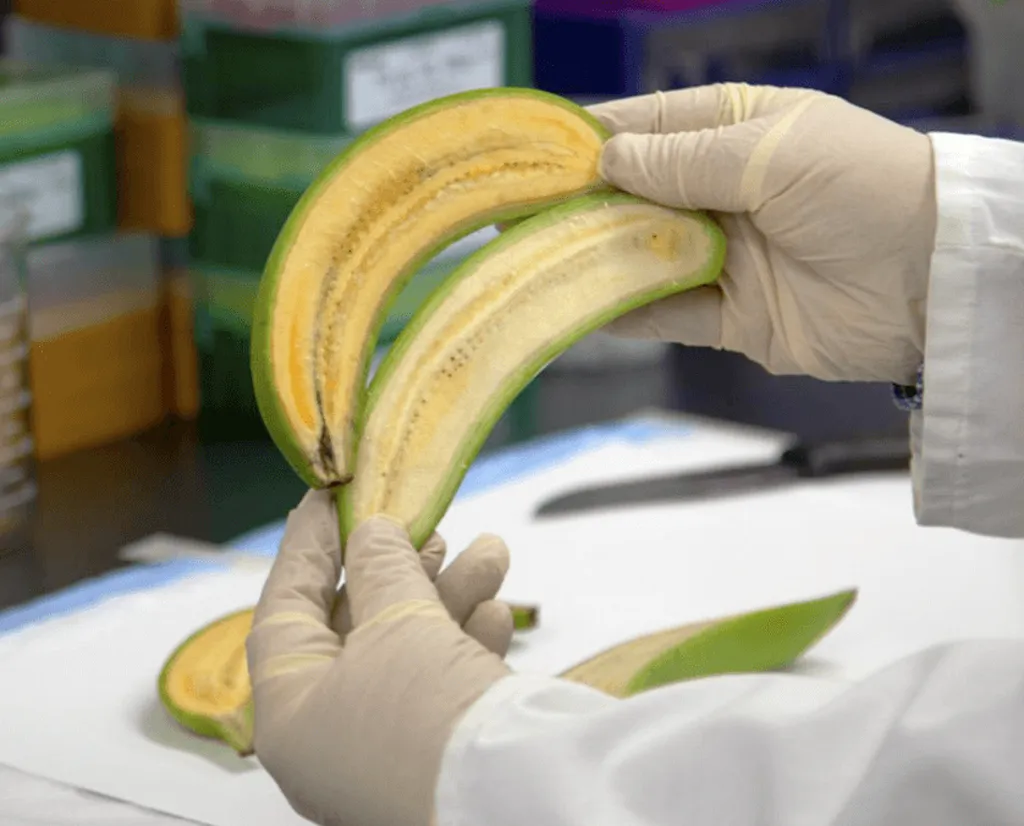In the heart of Uganda, where bananas are not just a fruit but a staple food, scientists have achieved a groundbreaking milestone that could revolutionize the future of this vital crop. Researchers, led by Frank Kalungi from the National Agricultural Research Laboratories of the National Agricultural Research Organisation in Kampala, have successfully employed CRISPR/Cas9 genome editing to modify the phytoene desaturase (PDS) gene in East African highland bananas, commonly known as “matooke.” This achievement, detailed in a study published in *Frontiers in Plant Science* (which translates to “Frontiers in Plant Science” in English), opens new avenues for improving banana crops, which are crucial for food security and economic stability in the region.
The study focused on two banana cultivars, Nakitembe (NKT) and NAROBan5 (M30), which are widely cultivated in the Great Lakes region of Africa. These bananas face numerous challenges, including environmental stresses and diseases, which have historically been addressed through conventional breeding and genetic engineering. However, these methods come with limitations, such as the unintended introduction of undesirable traits and complex regulatory hurdles. Genome editing offers a more precise and efficient alternative.
Using CRISPR/Cas9 technology, the researchers designed two single guide RNAs (sgRNAs) targeting the PDS gene, which plays a critical role in the carotenoid biosynthetic pathway. Carotenoids are essential pigments that give bananas their characteristic yellow color and contribute to their nutritional value. By disrupting the PDS gene, the scientists aimed to understand the potential of genome editing for crop improvement.
The results were striking. Up to 100% of the Nakitembe banana plants and 94.6% of the M30 plants exhibited albino or variegated phenotypes, indicating successful disruption of the PDS gene. Carotenoid analysis confirmed a significant reduction in total carotenoid content in the edited plants, with complete albinos showing no detectable carotenoids. Sequence analysis further revealed that all edited events had frameshift mutations, confirming the effectiveness of the CRISPR/Cas9 system in disrupting the PDS gene.
“This study demonstrates the high precision and efficiency of CRISPR/Cas9 genome editing in East African highland bananas,” said Frank Kalungi, the lead author of the study. “It provides a robust platform for targeted improvement of these crops, which are vital for food security and economic stability in the region.”
The implications of this research are far-reaching. Genome editing offers a powerful tool for developing banana varieties that are more resilient to environmental stresses and diseases, ultimately enhancing food security and economic opportunities for farmers. The success of this study paves the way for further research and application of genome editing in other crops, potentially transforming agriculture on a global scale.
As the world grapples with the challenges of climate change and food security, innovations like this are crucial. The ability to precisely edit plant genomes holds the promise of creating more sustainable and productive agricultural systems, ensuring a stable food supply for future generations. With the validation of this genome editing system, the future of banana cultivation in East Africa and beyond looks brighter than ever.
This research, published in *Frontiers in Plant Science*, marks a significant step forward in the field of agricultural biotechnology. It underscores the potential of CRISPR/Cas9 technology to drive innovation and improve crop resilience, ultimately benefiting farmers and consumers alike. As the scientific community continues to explore the applications of genome editing, the possibilities for enhancing agricultural productivity and sustainability are limitless.

